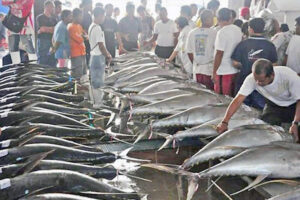THE National Tuna Management Plan (NTMP) will seek to encourage more private-sector investment in the tuna industry, the Bureau of Fisheries and Aquatic Resources (BFAR) said.
BFAR spokesman Nazario C. Briguera said the investment plan follows Agriculture Secretary Francisco P. Tiu Laurel, Jr.’s calls for the private sector to participate in efforts to boost food security and self-sufficiency at the recent National Tuna Conference in General Santos City.
Mr. Briguera could give no estimates of the investment needed, but said private-sector participation “is one of the strategies identified in the National Tuna Management Plan.”
The NTMP updates the National Tuna Plan of 2018, and sets growth goals for the industry between 2026 and 2030.
Mr. Laurel has also called illegal fishing a direct threat to tuna stocks.
At the National Tuna Congress in General Santos City last week, Mr. Laurel said Philippine tuna enjoys a reputation for quality, but warned that “turbulent waters” lie ahead because of climate change, global sustainability mandates, labor issues, and the persistent threat of illegal, unreported, and unregulated (IUU) fishing,” according to a statement from the Department of Agriculture (DA).
The Philippine Statistics Authority reported that tuna production rose 20.5% in 2024 to 494,047.02 metric tons. Exports rose 31% to $514.47 million.
Overall fisheries output in the second quarter was down 2.6% year on year.
Mr. Laurel, speaking in General Santos called for united action across the entire industry, from fishing operators, canners, exporters, and regulators, and backed science-based management of tuna stocks, tighter enforcement, better traceability, and stronger support for fisherfolk.
The latest Illegal Fishing Index — a ranking of countries’ vulnerability to illegal fishing — puts the Philippines 21st out of 152 countries, with a score lower than the global average.
Republic Act No. 10654, or the Philippine Fisheries Code of 1998, restricts illegal fishing practices like explosives, poaching, and the capture of endangered species.
Mr. Briguera said fish imports scheduled for October to December are intended to offset low productivity of fisherfolk in this part of the year.
Mr. Briguera said BFAR supports the restoration of agriculture extension functions to the National Government, as proposed by Sen. Francis Pancratius N. Pangilinan.
Renationalization “will help the government deliver its serves more effectively and grant farmers and fisherfolk better access to technology,” Mr. Briguera said. — Andre Christopher H. Alampay

